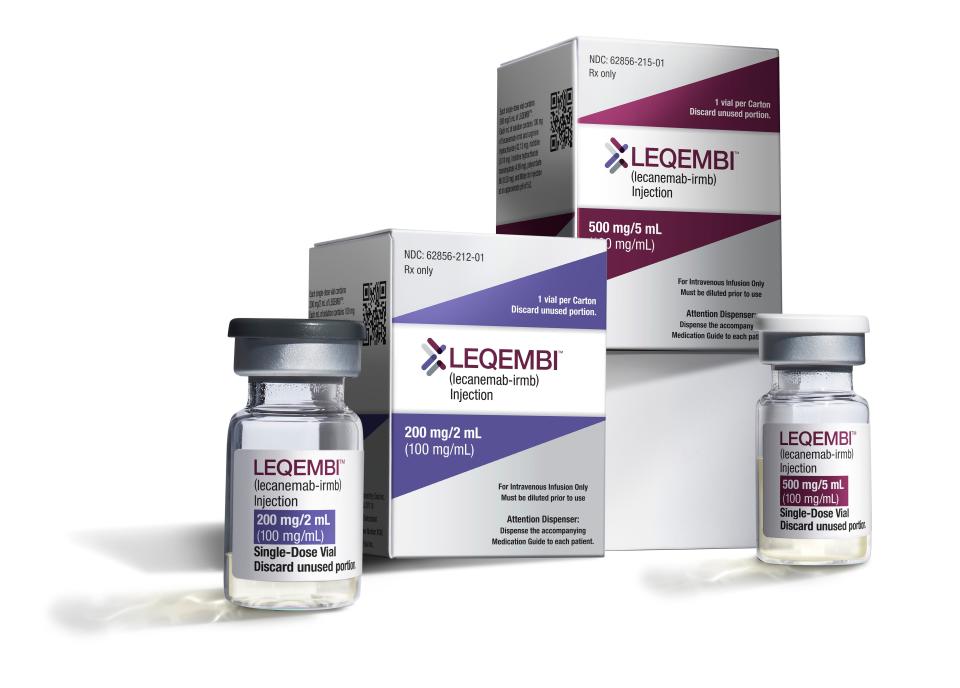What you need to know about newly approved Alzheimer's drug
An estimated six million Americans are currently living with Alzheimer’s disease — and in the next 25 years experts say that number will more than double.
There's currently no cure for Alzheimer's, an invariably fatal, degenerative neurological condition that impacts memory and cognition.
For decades, researchers have worked tirelessly to develop medications that may slow the disease’s progression.
On July 5 the U.S. Food and Drug Administration granted full approval for a new medication — Lecanemab — to treat Alzheimer’s patients.
To better understand what this means — both for current and future Alzheimer’s sufferers — we spoke with neurologist Dr. Damon Salzman, an Alzheimer’s specialist with Cleveland Clinic Weston Hospital.
More Health Matters: Track star's death latest example of Black maternal mortality risk
A dozen things to know about the new Alzheimer's drug

Q: Prior to the Lecanemab approval, how was Alzheimer’s treated medically?
A: We have been able to use certain medications that can temporarily reduce certain symptoms. In people with advanced Alzheimer's, certain nerve cells are much less active. This means that it takes longer for brain signals to be sent. Acetylcholinesterase (AChE) inhibitors increase levels of acetylcholine, a substance in the brain that helps nerve cells communicate with each other.
In the later stages of dementia, a significant number of people will develop what's known as behavioral and psychological symptoms of dementia. Antidepressants may sometimes be given if depression is suspected as an underlying cause of anxiety. Cognitive stimulation therapy (CST) is another way we try to reduce symptoms. It involves having the patient take part in group activities and exercises designed to improve memory and problem-solving skills.
Q: How does Lecanemab work?
A: In research, Lecanemab has been shown to gradually remove abnormal buildup of the protein amyloid beta, which is linked to the plaques in the brains of those with Alzheimer’s disease and may cause the disease. In people in the earliest symptomatic stages of Alzheimer’s disease, removal of amyloid appears to slow disease progression symptoms.
The first thing to understand about Lecanemab is that it’s a monoclonal antibody.

Inside the human body, antibodies “mark” or “label” molecules that need to be removed by the immune system. Normally, these are bacteria, viruses and toxins. Lecanemab is manufactured to “stick” to amyloid beta protein, enabling the immune system to gradually remove the protein from the brain.
However, it’s important to understand that Lecanemab does not completely stop or reverse Alzheimer’s disease.
More on brain health: New study details how 10,000 steps at brisk pace decreases dementia risk
Q: How is Lecanemab different from other medications that haven’t been approved?
A: Aducanumab (ADUHELM) is a monoclonal antibody that to date has received “FDA-accelerated” — but not full — approval. Cleveland Clinic does not offer it for clinical use at this time. Lecanemab has now received full FDA approval based on evidence of symptomatic effects that were not clearly seen with Aducanumab. Both are monoclonal antibodies that target the amyloid beta of Alzheimer’s disease, but are not identical, which may explain the difference in efficacy.
Q: How is Lecanemab administered and how often is it taken?
A: Lecanemab is delivered via infusion — directly into the vein through a needle or catheter — every two weeks.
Q: What are the purported benefits?
A: Lecanemab is the first new Alzheimer's drug with full approval in 20 years and is one of the first therapies that can slow the progression of Alzheimer’s disease — not just treat its symptoms.
Q: What are the potential side effects and/or drawbacks?
A: Like with any medication, different people may have certain specific reactions to Lecanemab. That said, the side effect most commonly seen during the studies was amyloid-related imaging abnormalities (ARIA). This means that, for certain patients, the removal of amyloid may cause leakiness of blood vessels and swelling and/or bleeding in the brain. Because of this potential side effect, regular magnetic resonance imaging (MRI) scans are required during treatment. This way, any changes to the brain can be detected immediately.
Q: Who is most likely to be prescribed the drug?
A: Lecanemab is for people in the early stages of Alzheimer’s disease. They may have mild symptoms suggesting Alzheimer’s or they’ve had confirmation of Alzheimer’s disease with testing.
Q: For whom — and why — would Lecanemab be contraindicated?
A: Lecanemab is not for use in individuals in moderate or late stages of Alzheimer’s disease or in any dementia other than Alzheimer’s disease. Lecanemab should not be used in patients diagnosed with other conditions that cause cognitive impairment and dementia (i.e., Lewy body dementia, vascular dementia/stroke, frontotemporal dementia or Parkinson’s disease).
Q: What is the monthly cost?
A: The current launch price of Leqembi, which is the brand name for Lecanemab, is around $26,500 annually. This translates to around $2,200 per month.
Q: How will health insurance plans and/or Medicare treat its coverage?
A: Lecanemab is a billable medication. As to how much patients will be responsible for out-of-pocket costs, that will be determined by patients’ individual insurance plans.
Q: What have you and your colleagues observed about Lecanemab prior to its approval?
A: Before FDA approval on July 5, Cleveland Clinic in Ohio was one of the sites for the multicenter clinical trial for Lecanemab. Dr. Babak Tousi, a neuro-geriatrician at Cleveland Clinic, said results from the 18-month trial showed participants who received the medication had a 27% reduction in amyloid beta plaque. Dr. Tousi said although that number may sound small, it is a good place to start.

Q: What are your future plans for incorporating the drug into the treatment programs of your patients?
A: Lecanemab will be offered at Cleveland Clinic’s Lou Ruvo Center for Brain Health in Las Vegas and in Cleveland, Ohio. At some point in the near future, we will also offer it at the Cleveland Clinic Weston location.
Lecanemab has the potential to be a game-changer in the fight against Alzheimer’s disease. It is the first drug in more than 20 years that has been approved to slow the progression of the disease.
Like I said earlier, it is not a cure and there is more work to be done but the current research is encouraging — and that’s why we’re hopeful that it is a step toward finding a cure.
This article originally appeared on Palm Beach Post: Lecanemab approved to treat early-stage Alzheimer's patients

